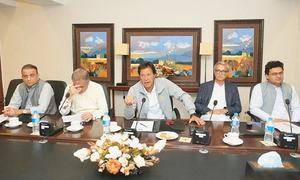Coalition Partners may not be needed to form govt at center
Shares

ISLAMABAD: With the results of Wednesday’s general elections still pouring in, the Pakistan Tehreek-i-Insaf is confident that the voters have put it in a position to form the government at the Centre on its own, without asking for support from other major parties, particularly the two arch-rivals — Pakistan Peoples Party and Pakistan Muslim League-Nawaz.
While the PTI leadership is busy drawing a sketch of its future federal government, other major parties, which have cried foul over the attempts to rig the polls, are yet to decide “what next”.
Under Article 91(2) of the Constitution, the president is bound to convene the first sitting of the National Assembly for the oath-taking of the newly elected members and elections for the speaker and deputy speaker 21 days after the general elections, by Aug 15.
Major parties alleging rigging in polls yet to come up with future strategy.
Sources in the parliamentary affairs ministry said the dates of Aug 6, 10 and 11 were under consideration of the government for convening the first session of the new assembly. They said the ministry wanted to see the new government in office before Aug 14 so that the newly elected prime minister and his cabinet could participate in the official Independence Day ceremonies.
A senior PTI leader said that though the party leadership was confident about victory before the elections, it was a little worried as all pre-poll opinion surveys were projecting 95 to 100 seats for the party, whereas a party was required to get at least 137 of the 272 general seats of the National Assembly to form the government. If a party manages to get 137 seats in the general elections, it can easily surpass the magical number of 172 with the inclusion of the members to be elected on the seats reserved for women and minorities.
The PTI leader, who has won the election on a Lahore seat, said that though the party had performed “outstandingly” in the elections and managed to become the single largest party in the lower house of parliament, it seemed that they were still a little short of the required number.
He said that so far the PTI had acquired 120 seats and it still required at least 17 seats. However, he said this number would further decrease when those members who had won multiple seats would have to retain one seat only and others would fall vacant. If the party fell short of the numbers, it could seek support of the Grand Democratic Alliance and independents, added.
Under the Constitution, those winning the elections independently can join a political party of their choice within three days of taking oath as member of the National Assembly.
PTI information secretary Fawad Chaudhry, when contacted, declared in categorical terms that in any case, they would not seek any alliance with the PPP or the PML-N to form the government at the Centre. He claimed that over the next 48 hours, a number of independents would join the PTI. He even claimed that the party would not only attain a simple majority, but also manage to get the support of more than 200 members in the 342-member National Assembly.
According to unofficial results announced so far, about a dozen independents have returned to the lower house of parliament and they can play a decisive role in the formation of the future government. The number of seats won by the PML-N, PPP and the Muttahida Majlis-i-Amal (MMA) stands at 110 — only 10 short of PTI’s seats — and political experts believe that preventing the PTI from forming its government will be a daunting task for the experienced leadership of these three parties.
Background interviews with leaders of the PPP and PML-N show that presently they have not thought of any plan to make joint efforts to prevent the PTI from forming its government at the Centre as the heads of the two parties are yet to come up with a clear stance and narrative over the issue of alleged rigging in the elections.
Talking to Dawn, PPP secretary general Farhatullah Khan Babar said the party leadership had convened a meeting of senior members and office-bearers in Karachi on Friday (today) to discuss a future strategy.
“First we will give a clear policy about the elections. Whether we accept these engineered elections or not,” said another senior PPP office-bearer, adding that it was only after “finalising a narrative” about the elections that they would discuss the future strategy.
When his attention was drawn to the offer by prime minister-in-waiting Imran Khan that the PTI would have no objection to any probe into the rigging charges, the PPP leader said they would respond to it after a discussion within the party.
When asked if there was a possibility of giving a call for a protest movement, he said such an option could not be ruled out. However, he said, the party would first have to look into the evidences required to prove the charges of rigging and manipulation in the elections.
The PML-N — the main contender to the PTI — has already declared that a “puppet mandate” to Imran Khan’s party was not acceptable to it.
Besides the PPP and PML-N, the MMA, Muttahida Qaumi Movement-Pakistan, Pak Sarzameen Party, Pakhtunkhwa Milli Awami Party and Balochistan National Party-Mengal are also raising almost similar complaints of foul play.
MMA chief Maulana Fazlur Rehman, who has lost the elections on two NA seats, has proposed a multi-party conference to devise a joint strategy. However, both PPP and PML-N leaders say they have not so far received any invitation for the conference from the MMA.
All these parties allege that their polling agents were forced out from polling stations without being provided with Form 45 (the statement of vote count) by presiding officers after the polling.
APP/AFP
